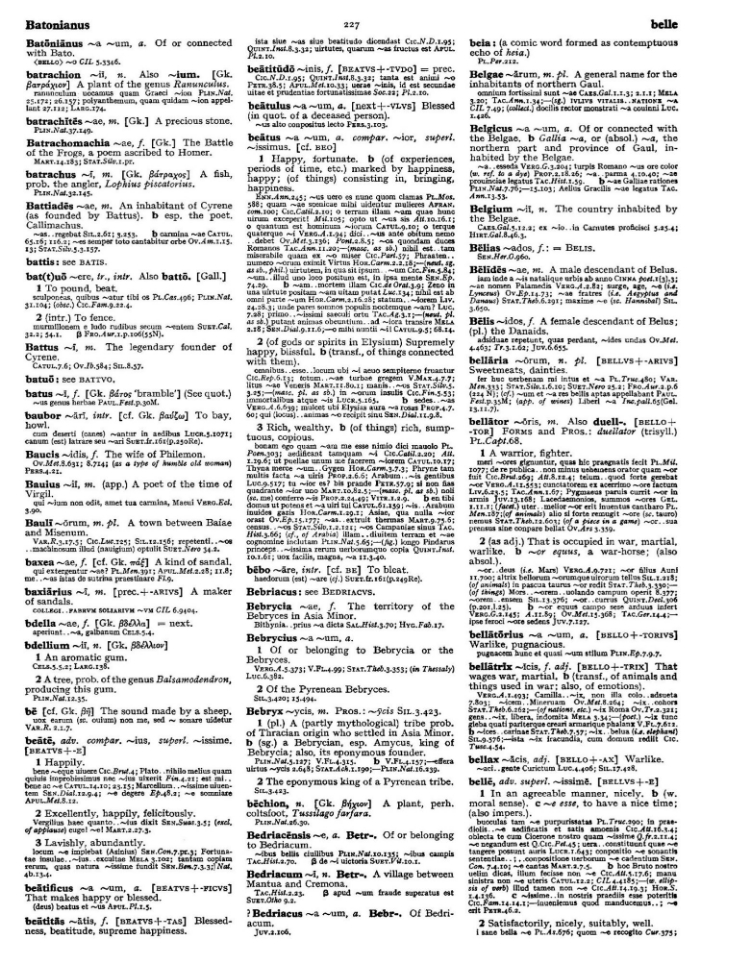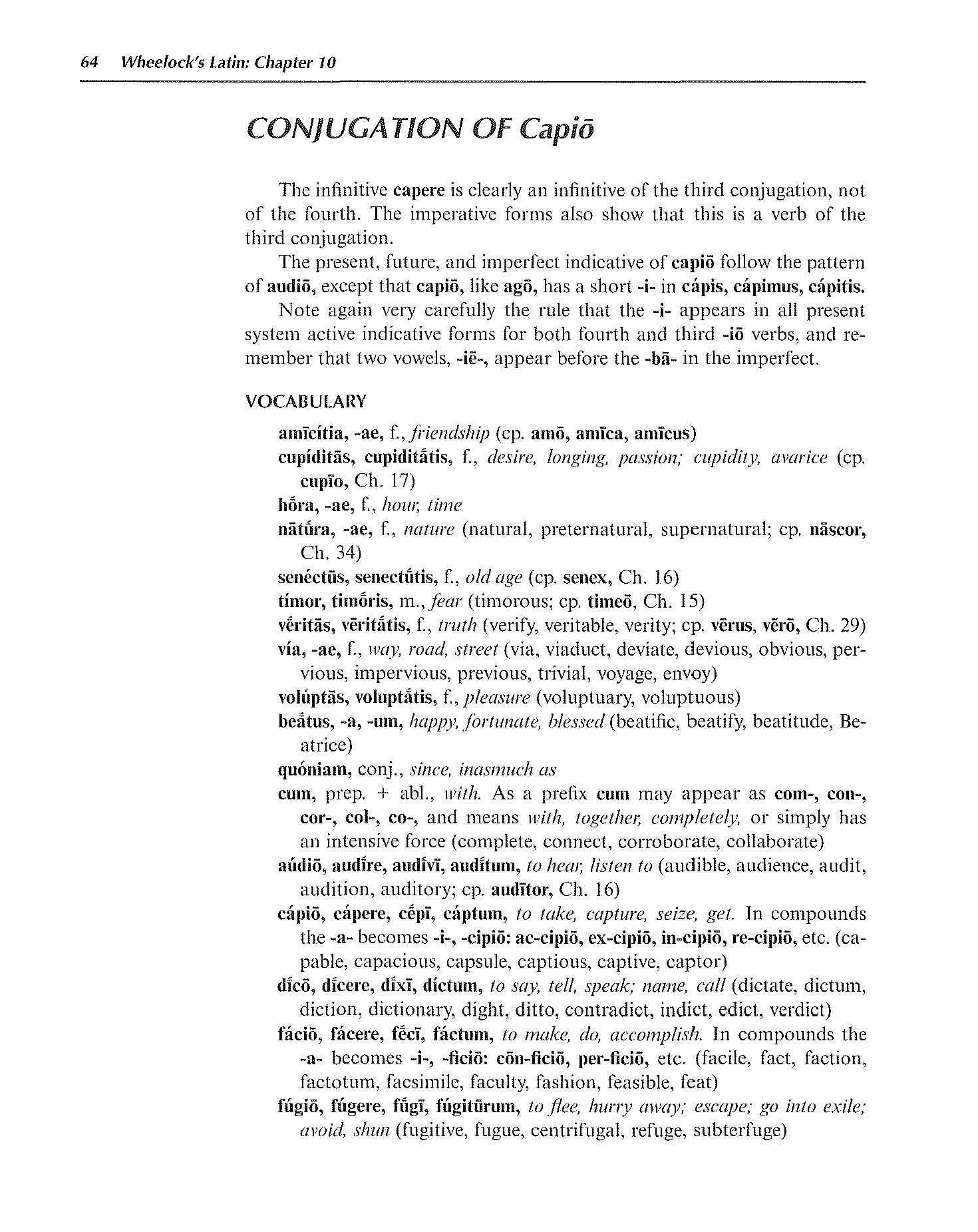
page_listing.tpl
page_subListingDetails.tpl
sub_listingDetails_style1.tpl
sub_listingDetails.title.tpl
beātus happy
beātus is a Latin Adjective that primarily means happy.
Definitions for beātus
Wheelock's Latin
Adjective
- 1
happy, fortunate, blessed
English derivatives:
beatific beatify beatitude Beatrice
Oxford Latin Dictionary
Adjective
- 1
Happy, fortunate. (b) (of experiences, periods of time, etc.) marked by happiness, happy; (of things) consisting in, bringing, happiness.
- 2
(of gods or spirits in Elysium) Supremely happy, blissful. (b) (transf., of things connected with them).
- 3
Rich, wealthy. (b) (of things) rich, sumptuous, copious.
Sentences with beātus
Latin to English
Aetās difficilis potest esse beāta.Compare A difficult life can be happy.
Nam quis potest beātus esse sī aliī hominēs frūctibus pācis lībertātisque carent?Compare For who can be happy if other human beings lack the enjoyments of peace and liberty?
Beātiōrēs cīvēs prō cīvibus miseriōribus haec dulcia faciēbant.Compare The more fortunate citizens used to do these pleasant things on behalf of the more unfortunate citizens.
O terra ille beatus, qui hic vir excipio: hic ingratus, si ejicio: miser, si amitto!Compare O happy that land which shall receive this man: ungrateful this land, if it shall banish him: wretched, if it shall lose him!
Beatus quippe vult esse, etiam non sic vivendo ut possit esse. Quid est ista voluntate mendacius? Unde non frustra dici potest omne peccatum est mendacium.Compare Man indeed desires happiness even when he does to live as to make happiness impossible. What could be more of a lie than such a desire? This is the reason why every sin can be called a lie.
Ultima semper expectanda dies homini, dicique beatus ante obitum nemo supremaque funera debet.Compare Man's last day must ever be awaited, and not to be counted happy till his death, till his last funeral rites are paid.
Data sources
Notes
- Definitions
- Frederick M. Wheelock, Wheelock's Latin, 6th ed., rev. Richard A. LaFleur (New York, NY: HarperCollins Publishers, 2005): 64.
- P. G. W. Glare, Oxford Latin Dictionary, Vols. 1-8 (Oxford: Clarendon Press, 1982): 227.
- Word frequencies
- Christopher Francese, "Latin Core Vocabulary," Dickinson College Commentaries, last modified 2014, http://dcc.dickinson.edu.
- Paul B. Diederich, The Frequency of Latin Words and Their Endings, PhD diss., (Columbia University, 1939).
- Louis Delatte, Suzanne Govaerts, Joseph Denooz, and Etienne Evrard, Dictionnaire fréquentiel et index inverse de la langue latine [Frequency Dictionary and Inverse Index of the Latin Language] (Liège, Belgium: Laboratoire d'analyse statistique des langues anciennes de l'Université de Liège [L.A.S.L.A.], 1981): 121.
Bibliography
Allen, Joseph H. Allen and Greenough's New Latin Grammar for Schools and Colleges: Founded on Comparative Grammar. Edited by James B. Greenough, George L. Kittredge, Albert A. Howard, and Benjamin L. D'Ooge. Boston, MA: Ginn & Company, 1903.
Crystal, David. A Dictionary of Linguistics and Phonetics. 6th ed. Oxford, UK: Blackwell Publishing, 2008.
Delatte, Louis, Suzanne Govaerts, Joseph Denooz, and Etienne Evrard. Dictionnaire fréquentiel et index inverse de la langue latine [Frequency Dictionary and Inverse Index of the Latin Language]. Liège, Belgium: Laboratoire d'analyse statistique des langues anciennes de l'Université de Liège (L.A.S.L.A.), 1981.
Diederich, Paul B. The Frequency of Latin Words and Their Endings. PhD diss., Columbia University, 1939.
Francese, Christopher. "Latin Core Vocabulary." Dickinson College Commentaries. Last modified 2014. http://dcc.dickinson.edu/latin-vocabulary-list.
Gildersleeve, Basil L., and Gonzales Lodge. Gildersleeve's Latin Grammar: Third Edition, Revised, and Enlarged. 3rd ed. London, England: Macmillan and Co., 1903.
Glare, Peter G.W. Oxford Latin Dictionary. Vols. 1-8. Oxford, England: Clarendon Press, 1982.
Krüger, Bernd. "Latin Conjugation Tables." Cactus2000. Accessed May 5, 2023. https://latin.cactus2000.de/index.en.php.
Pierson, Nick. "Sound of Text." Accessed October 26, 2019. https://soundoftext.com.
Wheelock, Frederick M. Wheelock's Latin. 6th ed. Revised by Richard A. LaFleur. New York, NY: HarperCollins Publishers, 2005.
Wiktionary Contributors. "Victionarium." Wikimedia Foundation, Inc. Updated March 18, 2019. https://la.wiktionary.org/wiki/Victionarium:Pagina_prima.
Citation
Chicago (17th ed.)
Allo Contributors. "beātus, beāta, beātum (adj.) - Latin Word Definition." Allo Latin Dictionary. Last modified . Accessed February 19, 2026. http://ancientlanguages.org/latin/dictionary/beatus-beata-beatum.
Entry created on . Last updated on .







